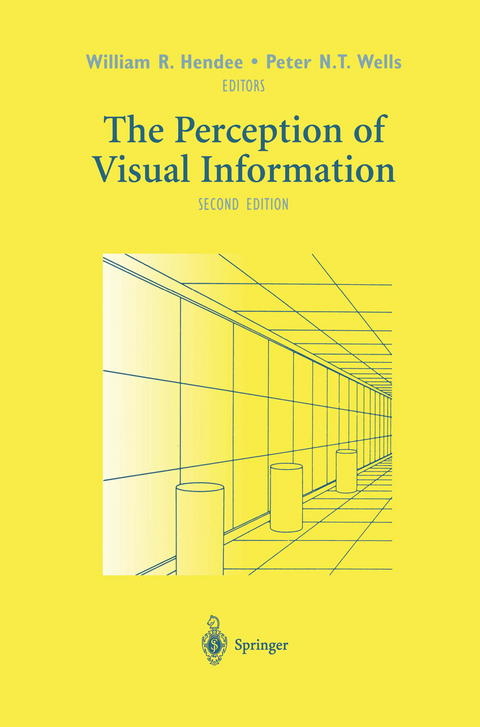
The Perception of Visual Information
Springer-Verlag New York Inc.
978-0-387-94910-9 (ISBN)
1 Physiological Optics.- 1.1 Introduction.- 1.2 Optical Anatomy of the Eye.- 1.3 Aberrations of the Eye.- 1.4 The Visual Pathways.- 1.5 Mechanisms of Viewing.- 1.6 ColorVision.- 1.7 Physical Performance of the Visual System.- 1.8 Information Transfer Rates.- 1.9 References.- 2 Detection of Vision Information.- 2.1 Introduction.- 2.2 Early Theories of Vision.- 2.3 Simple Experiments.- 2.4 Adaptation and After Images.- 2.5 Three-Dimensional Vision.- 2.6 Stereoscopic Viewing.- 2.7 Cross-Eyed Technique of Three-Dimensional Viewing.- 2.8 Models of the Visual System.- 2.9 References.- 3 Quantification of Visual Capability.- 3.1 Introduction.- 3.2 Visual Acuity.- 3.3 Contrast Sensitivity.- 3.4 Visual Physiology.- 3.5 Visual Filtering.- 3.6 Causes of Vision Loss.- 3.7 Detection and Identification of Visual Signals.- 3.8 Conclusions.- 3.9 References.- 4 A Multiscale Geometric Model of Human Vision.- 4.1 Introduction.- 4.2 Scale-Space.- 4.3 Scaled Differential Operators.- 4.4 Image Structure.- 4.5 Description of the Early Vision System.- 4.6 Differential Invariants.- 4.7 Applications.- 4.8 Discussion.- 4.9 References.- 5 Human Response to Visual Stimuli.- 5.1 Introduction.- 5.2 Measuring Human Responses.- 5.3 Complex Stimuli.- 5.4 References.- 6 Cognitive Interpretation of Visual Signals.- 6.1 Early Views of Cognition.- 6.2 Western Philosophical Speculations on Cognition.- 6.3 Visual Texture Discrimination.- 6.4 Illusions.- 6.5 Color Vision.- 6.6 References.- 7 Visual Data Formatting.- 7.1 Introduction.- 7.2 Brightness, Contrast, and Details.- 7.3 Texture Discrimination and Edge Detection.- 7.4 Medical Imaging and Information.- 7.5 Visual Information and Communication.- 7.6 Conclusions.- 7.7 References.- 8 Image Manipulation.- 8.1 Introduction: The Digital Image.- 8.2 Interpolation.- 8.3 Gray-Level Manipulation.- 8.4 Filtering.- 8.5 Geometric Processing and Image Co-Registration.- 8.6 Image Subtraction.- 8.7 Segmentation.- 8.8 Maximum Intensity Projection.- 8.9 Conclusion.- 8.10 References.- 9 Physical and Psychophysical Measurement of Images.- 9.1 Introduction.- 9.2 Physical Measurements of Image Quality.- 9.3 Limitations of Physical Analysis.- 9.4 Measuring Observer Performance: Basic Principles of ROC analysis.- 9.5 General Issues Regarding the Use of ROC Methods in Medical Imaging Research.- 9.6 Statistical Issues in ROC Analysis.- 9.7 References.- 10 Computer Vision and Decision Support.- 10.1 Introduction.- 10.2 Computer Vision.- 10.3 Computer Vision Examples.- 10.4 Decision Support.- 10.5 A Decision Support Example: Mammography.- 10.6 Combining Decision Support and Computer Vision.- 10.7 References.- 11 Architecture and Ergonomics of Imaging Workstations.- 11.1 Architecture of Imaging Workstation.- 11.2 Examples of Imaging Workstation.- 11.3 Ergonomics of Imaging Workstation.- 11.4 References.- 12 Virtual Reality and Augmented Reality in Medicine.- 12.1 Introduction.- 12.2 Medical Applications of VR Technology.- 12.3 Augmented Reality in Image-Guided Surgery.- 12.4 Conclusions and Future Work.- 12.5 References.- 13 Problems and Prospects in the Perception of Visual Information.- 13.1 Aspects ofVisual Perception.- 13.2 Conclusions.- 13.3 References.
| Zusatzinfo | XVIII, 409 p. |
|---|---|
| Verlagsort | New York, NY |
| Sprache | englisch |
| Maße | 155 x 235 mm |
| Themenwelt | Geisteswissenschaften ► Psychologie ► Biopsychologie / Neurowissenschaften |
| Informatik ► Theorie / Studium ► Künstliche Intelligenz / Robotik | |
| Medizin / Pharmazie ► Allgemeines / Lexika | |
| Medizin / Pharmazie ► Studium ► 1. Studienabschnitt (Vorklinik) | |
| Naturwissenschaften ► Biologie ► Biochemie | |
| Naturwissenschaften ► Biologie ► Humanbiologie | |
| Naturwissenschaften ► Biologie ► Zoologie | |
| Naturwissenschaften ► Physik / Astronomie ► Angewandte Physik | |
| ISBN-10 | 0-387-94910-0 / 0387949100 |
| ISBN-13 | 978-0-387-94910-9 / 9780387949109 |
| Zustand | Neuware |
| Haben Sie eine Frage zum Produkt? |
aus dem Bereich


